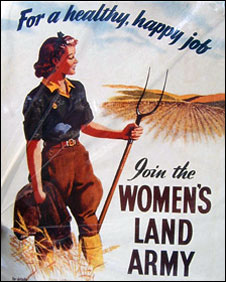The first Women's Land Army was formed in Britain during the First World War in 1917 when 18,000 women and girls were enrolled and undertook all kinds of agricultural work. It was disbanded after the armistice in 1918 but in May 1939, as the Second World War loomed, WLA committees were appointed for England and Wales by the Ministry of Agriculture and Fisheries and the organisation again came into being when the war started on September 3rd that year. The Women's Land Army was therefore
re-formed that year to work on farms and estates, milking cows, digging
ditches, making hay, sowing seeds and harvesting crops, to help alleviate food shortages. The Women's Timber
Corps was set up in 1942 to work in forests to provide wood for the war
effort, felling trees, cutting trees and sharpening saws. The girls received little or no official recognition for their work during the war years but in 2008, the government agreed that their efforts should be acknowledged with the award of a special badge. It was presented to both members of the Women's Land Army and Women's Timber Corps, nicknamed Land Girls and Lumber Jills, and in July, fifty of them attended a ceremony in Downing Street hosted by Prime Minister Gordon Brown who thanked the women and conceded that their varied efforts should have been recognised earlier. "We have been slow to thank you", said Mr Brown. "We could have done this years ago but I'm pleased that we can do it now. We owe you a huge debt of gratitude. The work these women did during the war is a story from our history that must be told again and again".
More than 30,000 badge
applications were received within a few weeks, among them one from Mrs
Edith Denham, aged 88, of West Road, Bourne, who joined the WLA in 1939
at her home town in Bradford but married and remained here after the
war. "I have been waiting for this for a long time", she said. She was
among the dozens of girls who were sent to the Bourne area, working on
farms and smallholdings near the town and in the surrounding villages.
Many more met and married local lads and stayed on and their families have
become part of the community and are still living here today.
A badge also went to Mrs Gwen Wesley. aged 86, of St Paul's Gardens, Bourne, who left Sunderland to join the Land Army in Bourne when she was 17. "We really were the forgotten army", she said. "But we did what we had to do and really felt we were doing something for our country in a time of need. If we had not all rallied round, things might have been very different today although whenever you mention the Second World War to young people now, it goes way over their heads. They just do not realise the pain and hardship it caused." She added: "I had not intended to apply for the badge but my children persuaded me that I should and now that it has arrived I am quite pleased. But I cannot help thinking that after so long and with more than half of us now dead, the money might have been better spent on our hospitals." See also A wartime dairymaid More memories of the Land Army
Go to: Main Index Villages Index |
